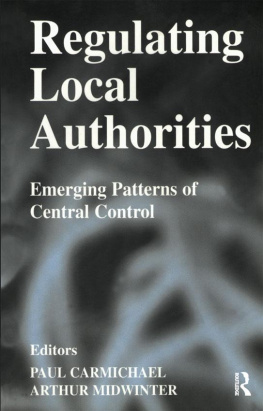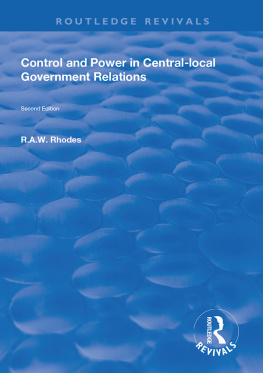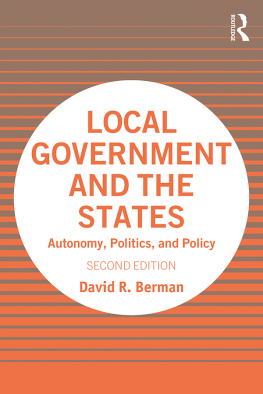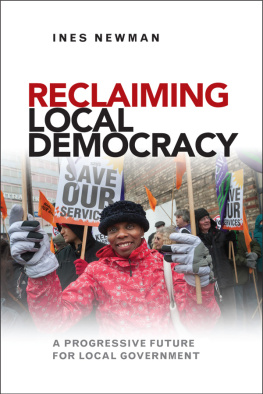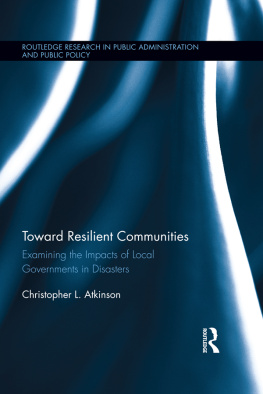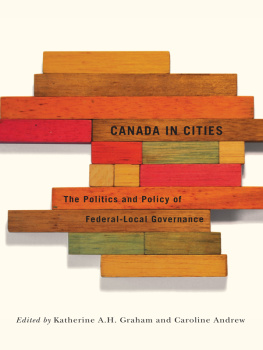REGULATING LOCAL AUTHORITIES
REGULATING LOCAL AUTHORITIES
Emerging Patterns of Central Control
Editors
PAUL CARMICHAEL
ARTHUR MIDWINTER
First published in 2003 by
FRANK CASS AND COMPANY LIMITED
Published 2016 by Routledge
2 Park Square, Milton Park, Abingdon, Oxon OX14 4RN
711 Third Avenue, New York, NY 10017
Routledge is an imprint of the Taylor and Francis Group, an informa business
Copyright 2003 Taylor & Francis
All rights reserved. No part of this book may be reprinted or reproduced or utilised in any form or by any electronic, mechanical, or other means, now known or hereafter invented, including photocopying and recording, or in any information storage or retrieval system, without permission in writing from the publishers.
Notice:
Product or corporate names may be trademarks or registered trademarks, and are used only for identification and explanation without intent to infringe.
British Library Cataloguing in Publication Data
Regulating local authorities : emerging patterns of central control
1.Central-local government relations 2.Central-local government relations - Europe I.Carmichael, Paul, 1967- II.Midwinter, Arthur F.
320.8
ISBN 13: 978-0-7146-8306-5 (pbk)
Library of Congress Cataloging-in-Publication Data
Regulating local authorities : emerging patterns of central control / editors Paul Carmichael, Arthur Midwinter
p. cm.
Includes bibliographical references and index.
ISBN 0-7146-5373-X (cloth) -- ISBN 0-7146-8306-X (paper)
1.Central-local government relations. 2. Federal government. 3. Comparative government. I. Carmichael, Paul, 1967- II. Midwinter, Arthur F
JC355 .R4418 2002 |
320.8--dc21 | 2002010657 |
This group of studies first appeared in a Special Issue of Local Government Studies (ISSN 0300-3930), Vol.28, No.3 (Autumn 2002)
[Regulating Local Authorities: Emerging Patterns of Central Control]
Contents
PAUL CARMICHAEL and ARTHUR MIDWINTER |
GEORGE JONES and JOHN STEWART |
NEIL McGARVEY |
ARTHUR MIDWINTER and PAUL CARMICHAEL |
HARALD BALDERSHEIM and KRISTER STHLBERG |
MIKE GOLDSMITH |
ROBERT CAMERON |
VIVIEN LOWNDES |
PAUL CARMI CHAEL and ARTHUR MIDWI NTER
The theme of this collection of essays is centrallocal government relations in comparative perspective. Specifically, each is concerned with some aspect of the policy and resource frameworks developed by central governments to regulate their relationships with local authorities. To varying degrees, national governments (and/or, in federal systems, provincial/regional/state governments) across the globe have attempted to exert greater control over the activities of local governments within their jurisdiction, in part in response to economic and fiscal pressure, but also because of a new right political ideology that regarded local authorities and their professionals as inefficient and non-responsive to consumers. While shared experiences exist, political strategies and policy instruments have varied. There is a need for comparative analysis of such developments, and this volume brings together papers from the UK, continental Europe and South Africa, as a contribution to academic research and to practitioner understanding of developments elsewhere.
In a British context, such comparative analysis is especially timely. It is over 25 years since the Layfield Report on Local Government Finance was published. Layfield argued that the erosion of financial autonomy in local government meant that only greater central accountability could resolve the problems in the context of the British financial system with its heavy dependence on central grants. The British system in the twentieth century developed through an expansion of local government powers and activities funded mainly by central grants, and delivered mainly by local authorities. Central-local relations operated within a framework in which legislation was largely permissive, where concepts such as efficient, appropriate and adequate local services were reserved for political judgement, within which administrative supervision by central departments was undertaken largely through consultation and conventions, and where funding initially by specific grants was gradually transformed into a system mainly funded by a block grant. The relationship was termed partnership by central government but, in practice, there were elements of hierarchy in relations with local authorities (Loughlin, 1996).
In the 1980s, the style of centrallocal relations changed, with greater emphasis on financial control; use of alternative agencies for local service delivery; and regulation, inspection and audit as mechanisms of control. The pragmatism and compromise characterising the informality of centrallocal relations post-1945 were replaced with informality and authoritative decision-making at the centre.
Reflecting growing academic interest in the subject, there have been several major ESRC programmes of research into centrallocal relations in the 1980s and local governance in the 1990s. Rhodes (1997) regards governance as a broader term than government, which recognises the range of institutions private, voluntary and public now involved in local service delivery, and argues that this has split up the departmental bureaucracies in central and local government.
We accept that there has been a development of mixed economies of provision in some local services, particularly community care, but also in services previously provided by Direct Labour Organisation. At the same time, however, large local government bureaucracies remain, for example, in education, police, fire and public libraries. We remain to be convinced that Britain has shifted from local government to local governance.
Empirical studies such as this collection of essays can assist in understanding such phenomena, and are particularly appropriate given the change on political context through a New Labour government and its devolution and modernisation programmes. In its modernisation agenda, for example, Labour offered significant reform to the regulatory framework for local government, reversing the centralising trends, reducing detailed interference and promoting diversity with an emphasis on what works (Labour Party, 1995). The Prime Minister himself saw local government as in need of strong leadership, greater coherence and improved service standards (Blair, 1998). Academics have contributed to the agenda. Stoker (2000) advocates five reforms needed to modernise local government:
- A need to shift from a focus on inputs to a concerns with outcomes;
- A commitment to in-house provision needs to give way to an open- minded approach to the procurement of services;
- A need to give less emphasis to the legitimacy that stems from internal party input and give more recognition to the legitimacy of a wide range of stakeholders;
- A shift from a culture that accepts public acquiescence in local decision-making to one that expects active citizen involvement;
- A shift in emphasis away from service provision to a role of community leadership for elected government.

